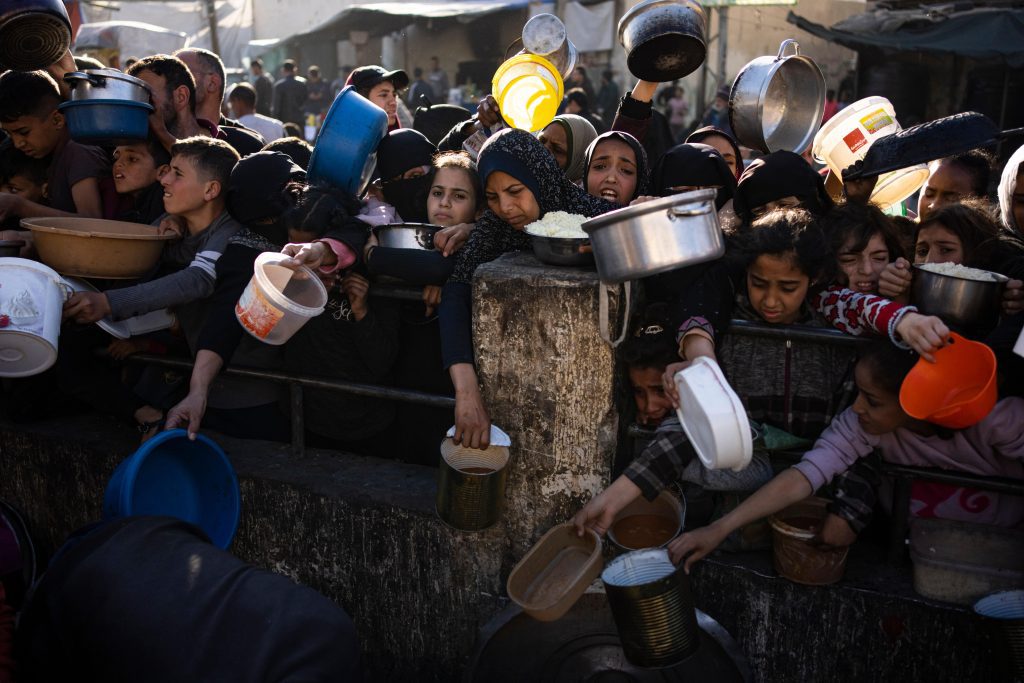By TIA GOLDENBERG (Associated Press)
TEL AVIV, Israel (AP) — The Israeli military stated on Wednesday that it plans to relocate a large portion of the 1.4 million displaced Palestinians residing in the Gaza Strip’s southernmost town of Rafah to “humanitarian islands” in the center of the territory in advance of its planned offensive in the area.
The situation of the people in Rafah has been a major area of concern for Israel’s allies — including the United States — and humanitarian groups, who are worried that an offensive in the densely populated region, which is home to many displaced people, would have disastrous consequences. Rafah is also the primary entry point for much-needed aid into Gaza.
Israeli Prime Minister Benjamin Netanyahu has expressed that an offensive in Rafah is crucial for the purpose of achieving Israel’s stated goal of dismantling Hamas following the Oct. 7 attack in which about 1,200 people, mostly civilians, were killed and around 250 were taken hostage and brought into Gaza. According to Gaza health officials, Israel’s invasion of Gaza has resulted in more than 31,000 deaths, significant destruction of the enclave, and the displacement of around 80% of Gaza’s 2.3 million people.
Rear Adm. Daniel Hagari, Israel’s chief military spokesman, stated that the relocation of those in Rafah to designated areas, which would be carried out in cooperation with international actors, is a crucial aspect of the military’s preparations for the anticipated invasion of Rafah, where Israel alleges that Hamas maintains four battalions it aims to eliminate.
Rafah has expanded in size in recent months as Palestinians in Gaza have fled the fighting in nearly every other part of the territory, with the town now being covered in tents.
“We need to ensure that 1.4 million people, or at least a significant portion of the 1.4 million, will relocate. Where? To humanitarian islands that we will establish with the international community,” stated Hagari during a briefing with reporters.
Hagari mentioned that these islands would offer temporary housing, food, water, and other necessities to the evacuated Palestinians. He did not specify when the evacuation of Rafah would take place, or when the offensive in Rafah would commence, indicating that Israel wanted the timing to be operationally sound and coordinated with neighboring Egypt, which has expressed a reluctance to accept an influx of displaced Palestinians across its border.
At the beginning of the conflict, Israel directed evacuees to a section of undeveloped land along Gaza’s Mediterranean coast, which it designated as a safe zone. However, aid groups reported that there were no concrete plans in place to receive large numbers of displaced individuals there. The area was also targeted by Israeli strikes.
More than 31,270 Palestinians have been killed in Gaza and the majority of its 2.3 million residents have been displaced, as per Gaza’s Health Ministry. The ministry does not differentiate between civilians and combatants in its count, but states that women and children account for two-thirds of those who have died.
Israel attributes the civilian death toll to Hamas because the terrorist group engages in combat in densely populated, residential areas. The military has claimed that it has killed 13,000 Hamas fighters, although it has not provided evidence to support this.
The U.S., Canada, and the E.U. have labeled Hamas as a terrorist organization.
In the meantime, fighting continued throughout Gaza. On Wednesday, an Israeli attack struck a UNRWA-run food distribution site in southern Gaza, killing one agency staff member and injuring 22 others.
The death has raised the total number of agency workers killed during the past five months of conflict to 165, as reported by UNRWA.
According to Gaza's health authorities, five people in total were killed in the strike on the yard of a UNRWA warehouse.
Hagari mentioned that the army is investigating the report.
The conflict has caused a humanitarian crisis resulting in increased hunger. The United Nations stated that aid delivery has been hindered by Israeli restrictions, ongoing hostilities, and the breakdown of order within Gaza. Israel denies restricting aid entry.
The situation has been particularly severe in northern Gaza, which was initially targeted by Israel in the early weeks of the war.
Hagari stated on Wednesday that Israel intends to provide a substantial amount of aid to the area and plans to increase the entry of goods from multiple points in northern Gaza after a pilot program saw six trucks deliver aid from the north on Tuesday. No specifics were given regarding the expected number of additional trucks and frequency of entry.
Hagari also mentioned that representatives from the U.S. military are anticipated in Israel this week to further coordinate the construction of a U.S. floating pier off the coast of Gaza, which is deemed as “significant” for northern Gaza.
In recent weeks, the U.S. and other countries have been airdropping food into northern Gaza to help address the crisis. Aid groups stated that air drops and bringing sea shipments are much less efficient and effective than truck transportation for delivering food.
___
Find more of AP’s coverage at https://apnews.com/hub/israel-hamas-war









